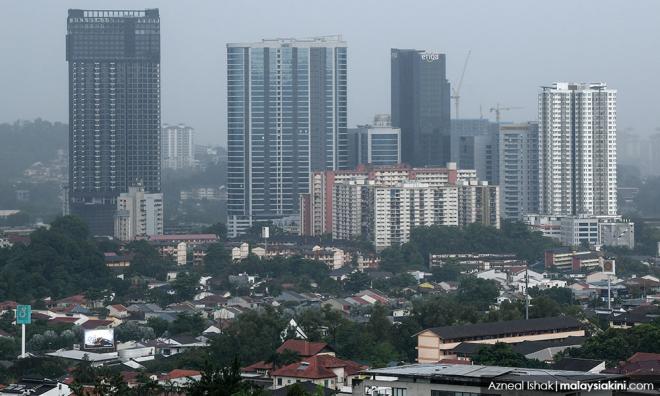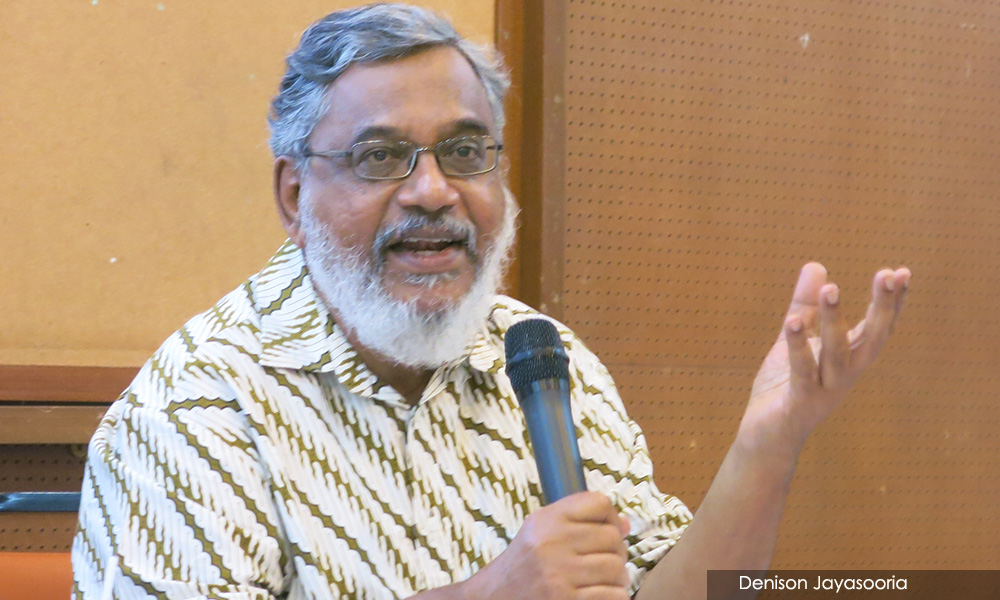
Housing developers who have a glut of unsold high-end properties should lower their prices in accordance to market forces, said economist Muhammed Abdul Khalid.
“We are a market economy, so allow the market to adjust […] which means the only rational thing for developers to do is to lower their prices. There is no need for the government to intervene in clearing all these high-end properties” he told reporters in Kuala Lumpur last night.
He was speaking after a forum on Budget 2020 hosted by Universiti Malaya’s Law Society and Accounting Club.
Muhammed, who is also the prime minister’s economic adviser, said this when asked about the Finance Ministry’s move under Budget 2020 to lower the floor price for high rise properties that foreigners can buy, from RM1 million to RM600,000.
The measure is meant to reduce the overhang of condominiums and apartments amounting to about RM8.3 billion in the second quarter of 2019. Finance Minister Lim Guan Eng had clarified that the lower threshold is only for existing unsold units and not new developments.
“While we understand why they need to reduce it, perhaps at the same time there can be more measures introduced for the low income, or the middle class, to have more options to buy affordable housing.
“There’s a mismatch. We build too much high-end houses, but we don’t build enough (low-end),” he said, adding that there is room to address affordable housing woes.

Previously, Housing and Local Government Minister Zuraida Kamaruddin (photo) stressed that the move to lower the threshold had come from the Finance Ministry and that it would be reconsidered if necessary.
Malaysians workers not paid enough
On a separate matter, Muhammed lamented the low wages earned by average workers in Malaysia compared to top executives.
"Data from the government shows how we reward employees is much less than in other countries.
"We only reward certain employees better, especially the CEO and top management who get multiples of what the average worker gets," he said.
He said it is better for the economy if the average workers are better paid as they will be spending their money as opposed to the rich.
According to the Department of Statistics, the rate compensation of employees to the gross domestic product in Malaysia is 35.7 percent in 2018.
By comparison, the rate was 39.7 percent in Singapore while in developed countries this can be between 50 percent and 60 percent or even higher.
Asked how this can be rectified, Muhammed said the government has little room to influence the private sector.
Staggering youth unemployment
Earlier during the forum, Universiti Kebangsaan Malaysia principal research fellow Denison Jayasooria (photo, below) said the unemployment rate for youths, which stands at 10.9 percent as of July, is a shocking figure considering that there are over two million foreign workers in the country.

He said critical questions must be asked, and solutions found for these issues - though they may not be simple.
“We need to interlink youth unemployment with foreign labour and minimum wage and have a serious heart to heart talk with the private sector,” he said.
Among the questions that need to be asked are whether universities are training graduates for the wrong jobs, companies looking elsewhere for employees, or if Malaysian youths don’t want to take on difficult jobs.
However, he pointed out that many Malaysians are willing to work in dirty, dangerous, or difficult jobs in Singapore.
He also took issue with a certain viewpoint about the RM500 employment incentive for youths under Budget 2020.
“I think it is disgraceful that the analysis of giving the wage incentive to young people actually means the young person doesn't work,” Denison said.
Under next year’s budget, youths who have been unemployed for over a year will receive RM500 a month for two years into their EPF savings should they get hired.
Their employer, meanwhile, will receive RM300 a month for two years.
Besides this, the budget provides an incentive of between RM350 to RM500 a month to local workers who replace foreigners, depending on the sector of the job.
The foreigner replacement scheme will also see employers being paid RM250 month for two years for hiring a local to replace foreigners.
Denison said Budget 2020 with its allocation for Bantuan Sara Hidup to 3.9 million households, as well as other subsidy measures prove right a UN report on poverty.
UN special rapporteur on extreme poverty and human rights Professor Philip Alston had said that official figures on poverty in the country, which currently is recorded at 0.4 per cent of the total households in 2016, or 24,700 households, were vastly inaccurate and do not reflect realities on the ground.
However, Denison said the allocations provided were “insignificant to the quantum required for empowering the poor”. - Mkini



No comments:
Post a Comment
Note: Only a member of this blog may post a comment.